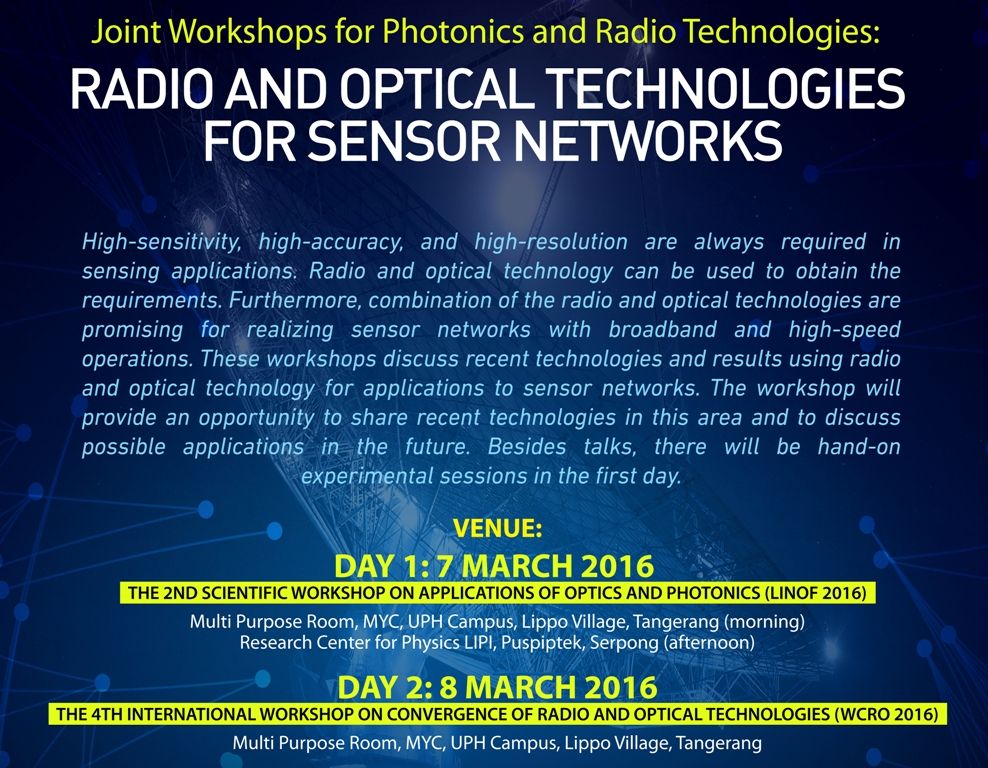
On 11 Feb. 2016, the world was surprised by the announcement of the first observation of the so-called gravitational waves by the LIGO and Virgo Scientific Collaborations. These waves remained undetected for 100 years, since Albert Einstein theoretically predicted it based on his famous general relativity theory (1916). Both LIGO (Laser Interferometer Gravitational-waves Observatory) in US and VIRGO in Europe are gigantic Michelson interferometers, where laser light was split into 2 beams, each passes through 4 km arm, which will then be combined again to detect changes along their propagation arms. Light is an extremely sensitive and accurate probe for detecting small changes, which in LIGO case, the gravitational waves only change the arm length of 1 X 10-21, an unimaginable small change. Such superior property of light finds its application not only in astronomy, but also for sensors in food industry, pollution detection, medical sensors, structural health monitoring, element detection for material composition analysis, etc. Furthermore, light also provides a large bandwidth for broadband.
On the other hand, radio has been long used for sensors of large objects, e.g. radar for detecting aircrafts, ships, etc. Besides, our daily life was very much influenced by radio communications. Our mobile phone, GPS, WiFi, etc. provide wireless connectivity to our gadgets and supply us with information to ease our activities.
What will happen when the two technologies work together? What new applications would appear? To answer these, a joined effort of Dep. of Electrical Engineering UPH; The Indonesian Institute of Sciences (LIPI), Indonesia; The National Institute of Information and Communications Technology (NICT), Japan; will present The 4th International Workshop on Convergence of Radio and Optical Technologies (WCRO 2016) and The 2nd Scientific Workshop on Applications of Optics and Photonics (LINOF 2016) with the theme “Radio and Optical Technologies for Sensor Networks†on 7 – 8 March 2016. The workshops will take place in Lippo Village Campus UPH, Tangerang, and Research Center for Physics, LIPI, Puspiptek, Serpong, Tangerang. The workshops are technically co-sponsored by prominent scientific organizations i.e. The Indonesian Optical Society (InOS), The Optical Society (OSA) Indonesia Section, and The Institute of Electrical and Electronics Engineers (IEEE) Indonesia Section, and sponsored by Sevensix, Inc., Japan. These activities are under the auspice of The Ministry of Internal Affairs and Communications, Japan. The workshop will provide an opportunity to share recent technologies in this area and to discuss possible applications in the future.
In Day 1, The 2nd Scientific Workshop on Applications of Optics and
Photonics (LINOF 2016, Lokakarya Ilmiah Nasional Optik dan Fotonik)
will consist of 2 parts. The theory sessions will start in the morning
in UPH Campus. After the session, a bus will take the participants to
Research Center for Physics (P2F) Labs., Puspiptek Serpong for
experimental sessions.
In Day 2, The 4th International Workshop on Convergence of Radio and
Optical Technologies (WCRO 2016) will discuss the applications of both
optics and radio technologies for sensing applications. This workshop will fully take place in
UPH Campus. Here experts from Japan and Indonesia will share their research on both radio and optics, and their interworkings.
